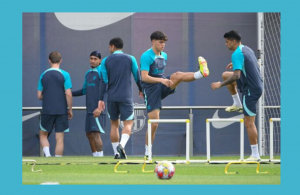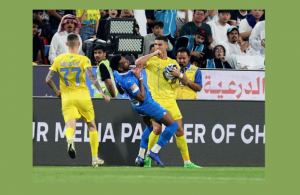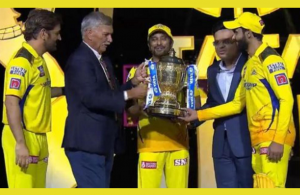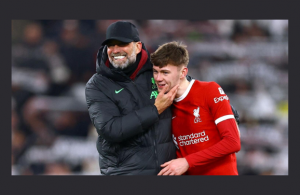- Molly O’Callaghan, a 19-year-old swimmer from Australia, etched her name in the annals of swimming history with a remarkable performance in the Women’s 200m Freestyle event
- Akshay Bhatia, 21, Wins his First PGA Tour Title at the Barracuda Championship
- Bruno Fernandes Replaces Harry Maguire as New Man Utd Captain
- Lionel Messi Surprises Teammate in group chat ahead of Grand Unveiling
- Man Utd Sign Keeper Andre Onana from Inter
Durant Leadership: Response and Reflection

Kevin Durant, often lauded for his exceptional basketball skills, has also been a subject of scrutiny regarding his leadership qualities. Recently, NBA legend Charles Barkley stirred up controversy during an alternative broadcast of the All-Star Game by labeling Durant as a “follower” rather than a leader. Barkley’s comments, although provocative, prompted Durant to address the issue and offer insights into his leadership style.
Barkley’s criticism of Durant’s leadership stemmed from his observations of Durant’s career trajectory, highlighting instances where Durant appeared to follow rather than lead. This critique was not isolated, as Barkley had previously characterized Durant as “very sensitive” and part of a generation that struggles with criticism. Barkley’s remarks during the All-Star Game sparked a wider discussion about Durant’s leadership capabilities and his role within teams.
In response to Barkley’s comments, Durant emphasized that while he does not seek the label of a leader, he also does not wish to be dismissed as lacking leadership qualities. He expressed frustration with critics who overlook the behind-the-scenes dynamics of his interactions with teammates and support staff, suggesting that their perceptions may not accurately reflect his leadership style.
One of Durant’s key points was that leadership manifests differently for each individual, and not every leader fits the traditional mold of being vocal or assertive. Suns coach Frank Vogel echoed this sentiment, acknowledging Durant’s leadership by example and his ability to speak up when necessary. Vogel emphasized the importance of authenticity in leadership, noting that players must lead according to their personalities rather than conforming to a predefined archetype.
Durant’s self-awareness also played a significant role in the discussion. He admitted that his personality may not be as charismatic or media-friendly as some of his peers, which could contribute to perceptions of his leadership abilities. However, Durant asserted that he does not feel the need to conform to external expectations of what a leader should be, preferring instead to focus on his actions and relationships within his teams.
The conversation extended beyond Durant’s leadership to his place in basketball history. Durant reflected on the ongoing debate about the “greatest of all time” (GOAT) and whether he should be included in such discussions. He acknowledged that while he may not have the same charisma or media presence as other basketball legends, his on-court accomplishments warrant consideration in GOAT conversations. Durant expressed a desire to engage in meaningful basketball discussions with other greats, focusing on shared experiences and insights rather than personal accolades.
Overall, Durant’s response to Barkley’s criticism provided a glimpse into his perspective on leadership and his approach to navigating the complexities of NBA stardom. While he may not fit the traditional mold of a leader, Durant’s impact on and off the court cannot be ignored. As the discussion surrounding Durant’s leadership continues, it serves as a reminder that leadership manifests in various forms, and true leadership is ultimately defined by actions and impact rather than labels or perceptions.
For More Related Updates Please Visit Our Official Website
By- Sahiba Suri
Related Posts
Recent Posts
-
Al Ain Shocks Al Hilal: Ends 34-Match Winning Streak
Al Ain Football Club, representing the...
-
Xavi: Barca Ready for Battle Against PSG
Barcelona Manager Xavi Hernandez has emphasized...
-
The Duel: Scottie Scheffler’s Winning Mindset
Scottie Scheffler’s victory at the Masters...
-
Ronaldo Red Card: Saudi Super Cup Drama
In the realm of football, few...
-
IPL 2024 Opener: CSK vs RCB
The upcoming IPL 2024 season is...
-
Padel Pros Shine in NAS Sports Tournament
The latest edition of the NAS...
-
Al Mouj Golf Wins Asian Tour Award
At the prestigious Asian Tour Awards...
-
Liverpool Trophy Pursuit Under Klopp’s Farewell
Liverpool aims to honor manager Juergen...


















